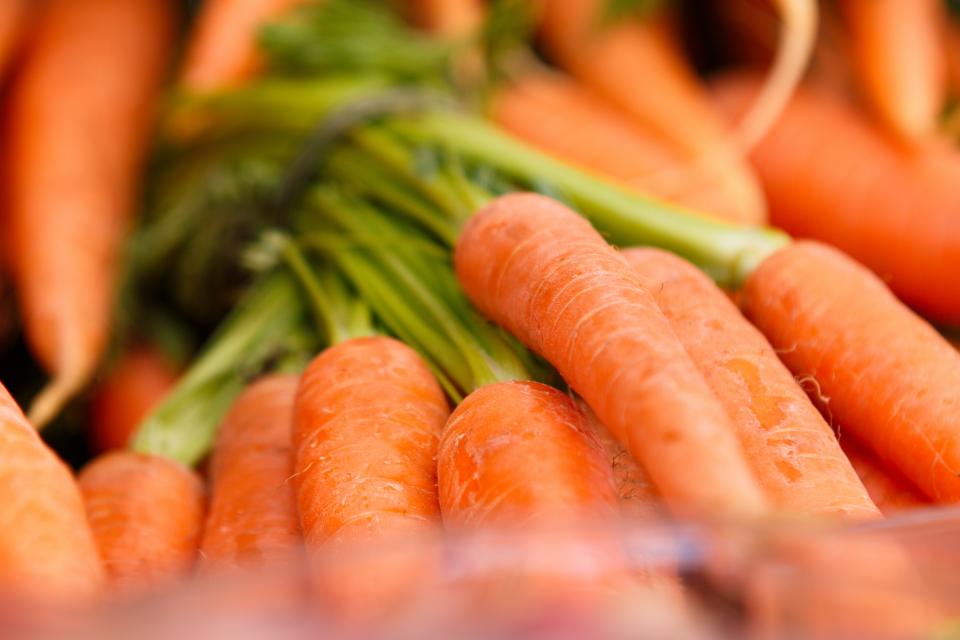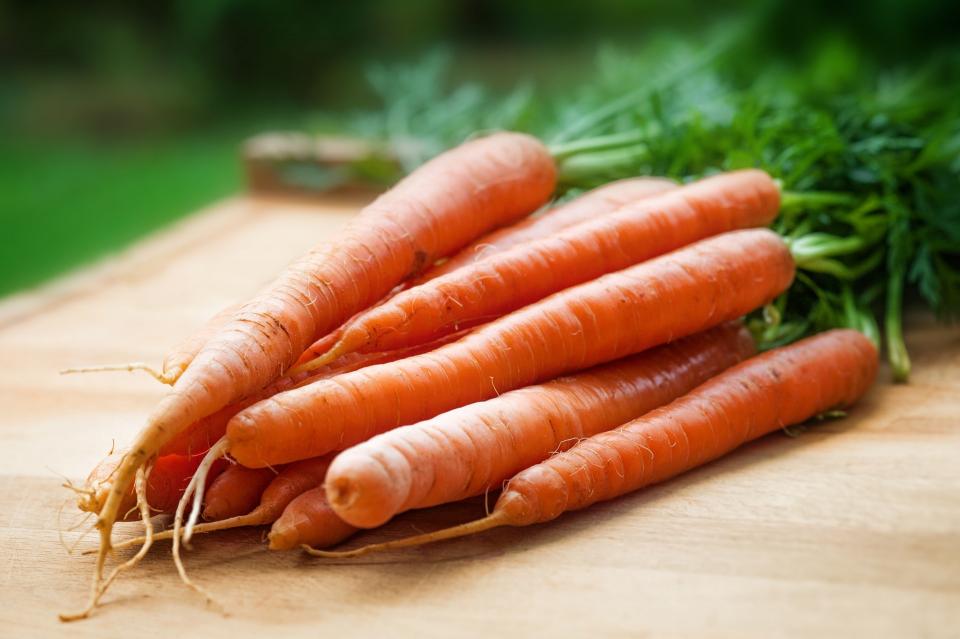This article delves into the complex relationship between carrots and rabbits, exploring their nutritional value, potential downsides, and responsible feeding practices. We'll unravel the truth behind the popular notion that carrots are a rabbit's favourite treat and discover whether this popular vegetable is truly beneficial or a potential detriment to their health.
Part 1: Debunking the Carrot Myth

1.1 Carrots in Popular Culture: A Misguided Association
The image of a rabbit happily munching on a carrot is ingrained in our collective consciousness. From children's books featuring bunny characters with carrot-shaped noses to animated cartoons depicting rabbits as carrot-obsessed, this association has become deeply rooted in our cultural understanding. However, this widespread perception doesn't necessarily reflect the reality of a rabbit's dietary needs.
1.2 The Nutritional Reality: Carrots Aren't a Rabbit's Staple Food
While carrots do contain some beneficial nutrients, such as vitamin A, they are not a primary food source for rabbits. Their high sugar content, particularly in the form of fructose, can be detrimental to a rabbit's delicate digestive system, leading to a range of health issues.
Part 2: The Hidden Dangers of Carrot Consumption

2.1 Sugar Overload: A Digestive Nightmare
Excessive sugar intake from carrots can wreak havoc on a rabbit's digestive system, leading to various unpleasant consequences. These include:
- Gastrointestinal upset: Carrots can cause diarrhoea, bloating, and gas, leading to discomfort and potential health complications like gut stasis, a life-threatening condition.
- Dental problems: The high sugar content can contribute to dental issues, such as tooth decay and overgrowth, which can cause pain, infection, and difficulty eating.
- Obesity: Carrots are relatively high in calories, and overconsumption can lead to weight gain, increasing the risk of other health problems like heart disease, diabetes, and joint problems.
2.2 Nutritional Imbalances: Lacking Essential Nutrients
Carrots lack the essential nutrients that rabbits need for a healthy diet. They are deficient in crucial elements like fibre, which is vital for digestive health and proper gut function. A lack of fibre can lead to digestive problems, weight gain, and even dental issues.
Part 3: Understanding a Rabbit's Natural Diet
3.1 Hay: The Cornerstone of a Healthy Diet
Hay should form the bedrock of a rabbit's diet, providing essential fibre and nutrients. Timothy hay is particularly recommended for adult rabbits due to its lower sugar content and higher fibre content, promoting healthy digestion and dental wear.
3.2 Fresh Greens: A Rainbow of Nutrients
Fresh greens are an integral part of a rabbit's diet, providing essential vitamins and minerals. It's crucial to offer a variety of leafy greens, such as:
- Kale
- Spinach
- Dandelion greens
- Parsley
- Collard greens
- Endive
- Watercress
These greens are rich in vitamins, minerals, and antioxidants, contributing to overall health and wellbeing.
3.3 Limited Treats: The Importance of Moderation
Treats should be given in small amounts and sparingly, representing a small percentage of their daily diet. Carrots can be offered occasionally, but always in moderation and as part of a varied diet, ensuring a balanced nutritional intake.
Part 4: Responsible Carrot Feeding Practices
4.1 Frequency and Quantity: Less is More
If you do decide to offer carrots, it's crucial to do so in moderation. A small piece, about the size of a fingernail, once or twice a week is generally considered safe for a healthy adult rabbit.
4.2 Carrot Variety: Opt for Whole, Fresh Carrots
Choose carrots wisely. Avoid baby carrots as they are often higher in sugar than regular carrots. Opt for whole, fresh carrots and ensure they are washed thoroughly before feeding.
4.3 Individual Needs: Consider Age and Health
It's important to consider your rabbit's individual needs when feeding carrots. Young rabbits, pregnant rabbits, or rabbits with health issues may be more sensitive to the sugar content and should have limited access to carrots or receive them under veterinary supervision.
Part 5: Exploring Healthy Alternatives to Carrots
5.1 A World of Nutrient-Rich Treats
Instead of relying on carrots, consider offering these healthier and more nutritious treats:
- Fresh herbs: Basil, parsley, cilantro, and dill are good options.
- Fresh vegetables: Bell peppers, broccoli florets, and cucumber are excellent choices.
- Commercial rabbit pellets: These provide a balanced nutritional profile when given in moderation and should be chosen carefully, avoiding those high in sugar or artificial ingredients.
5.2 The Power of Variety: A Culinary Adventure for Your Bunny
Offer a variety of treats to keep your rabbit engaged and ensure they receive a diverse range of nutrients. Variety promotes both physical and mental wellbeing, preventing boredom and encouraging healthy eating habits.
Part 6: Recognising Signs of an Unhealthy Diet
6.1 Observing Your Rabbit's Health: Early Detection is Key
It's crucial to be observant of your rabbit's health and behaviour. Signs of an unhealthy diet include:
- Weight gain or loss, indicating a potential imbalance in calorie intake or lack of essential nutrients.
- Digestive issues, such as diarrhoea or constipation, suggesting potential problems with gut health or fibre intake.
- Loss of appetite, which can be a sign of discomfort, illness, or a lack of interest in the food offered.
- Lethargy, indicating a potential lack of energy due to inadequate nutrition or underlying health issues.
- Dental problems, such as overgrown teeth, which can occur due to a lack of fibre in the diet and hinder their ability to chew properly.
Part 7: Seeking Professional Guidance
7.1 Consulting a Veterinarian: A Vital Step for Your Rabbit's Well-being
For any concerns regarding your rabbit's diet, consult with a veterinarian who specializes in rabbits. They can provide personalized advice based on your rabbit's individual needs and health status, offering guidance on optimal nutrition and ensuring their continued wellbeing.
Part 8: FAQs: Addressing Common Concerns
8.1 What are the best treats for rabbits?
The best treats for rabbits are fresh herbs, leafy greens, and small pieces of fresh vegetables. Avoid treats that are high in sugar, such as dried fruit, processed snacks, and sugary pellets.
8.2 Can I give my rabbit a whole carrot?
It's not recommended to give a rabbit a whole carrot. The high sugar content and lack of essential nutrients can be detrimental to their health.
8.3 How often should I give my rabbit carrots?
If you do decide to offer carrots, a small piece, about the size of a fingernail, once or twice a week is generally considered safe for a healthy adult rabbit.
8.4 Can carrots cause digestive problems in rabbits?
Yes, carrots can cause digestive problems in rabbits, particularly if given in excess. Their high sugar content can lead to diarrhoea, bloating, and gas, potentially leading to more serious digestive issues like gut stasis.
8.5 What is the best way to feed my rabbit carrots?
If you choose to offer carrots, ensure they are fresh and washed thoroughly. A small piece, about the size of a fingernail, can be given once or twice a week.
8.6 What are the signs of a healthy rabbit?
A healthy rabbit will have a shiny coat, bright eyes, and a healthy appetite. They will be active and playful and have regular bowel movements.
8.7 Can baby carrots be harmful to rabbits?
Baby carrots are often higher in sugar than regular carrots, making them less suitable for rabbits. It's best to avoid feeding baby carrots to your rabbit.
8.8 What if my rabbit eats a lot of carrots?
If your rabbit has eaten a significant amount of carrots, it's important to contact your veterinarian. They can assess the situation and recommend the best course of action, which may include dietary adjustments or monitoring for potential complications.
Everyone is watching
-

Do Rabbits Lay Eggs? (The Surprising Truth)
OTHER TYPES OF PETSThis article will unravel the common misconception that rabbits lay eggs, exploring the fascinating world of r...
-

What's a Group of Rabbits Called? (A Comprehensive Guide)
OTHER TYPES OF PETSThis article delves into the fascinating world of rabbits, exploring the various terms used to describe a grou...
-

Can Rabbits Eat Grapes? A Guide to Safe Rabbit Treats
OTHER TYPES OF PETSThis comprehensive guide will explore the safety and suitability of grapes for rabbits, providing detailed inf...
-

Predators That Hunt Rabbits: A Guide to Natural Enemies
OTHER TYPES OF PETSI've always been fascinated by the circle of life, that delicate dance between predator and prey. Growing up ...
-

Are Rabbits Nocturnal Animals?
OTHER TYPES OF PETSThe question of whether rabbits are nocturnal animals is a fascinating one, with a surprisingly complex answer...
